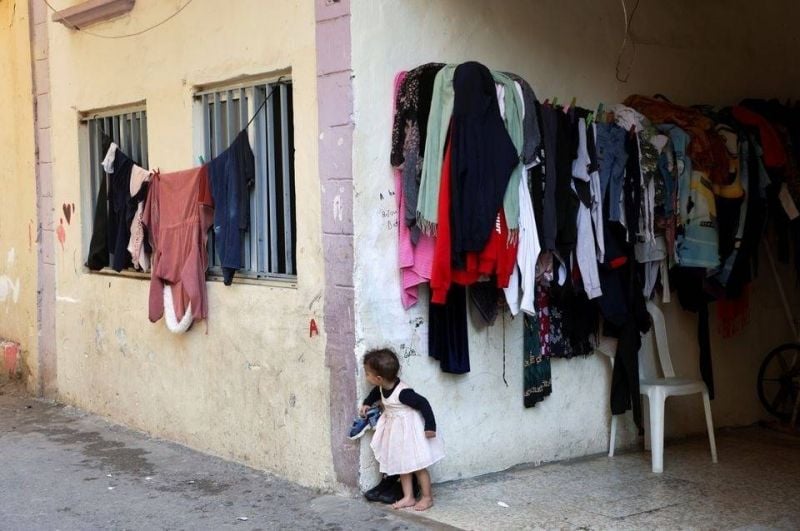
A child peeks from behind a corner of a building in Beirut's Karantina district. (Credit: Mohamed Azakir/Reuters)
BEIRUT —The rate of Lebanese families sending their children to work surged sevenfold between April and October, reaching 7 percent, while by October 2021, more than half of Lebanese households will have at least one child who has skipped a meal due to a “dramatic deterioration of living conditions,” a report issued on Tuesday by the UN Children’s Fund (UNICEF) revealed.
“The percentage of Lebanese children who required primary health care and did not receive it rose from 18.2 percent to 35.8 percent — it almost doubled,” Yukie Mokuo, representative of the UN Children's Fund (UNICEF) in Lebanon, said during a press conference on Tuesday, explaining that increase took place between April and October, 2021.
When non-Lebanese children are included, the number increased from 28 percent in April to almost 34 percent in October, according to the report.
UNICEF’s latest report, dubbed Surviving Without The Basics, shows that the situation in Lebanon has alarmingly worsened over the past six months, with children struggling to receive the nutrition, healthcare, education and protection they should be getting.
Children have been particularly struck by the country’s grave economic crisis, which has been compounded by COVID-19 and left nearly eight in ten of the country’s residents impoverished. The education of 700,000 children is also threatened, including 260,000 Lebanese, according to the research.
Families’ capacity to sustain their children is being impacted by the rising unemployment and rising prices as the Lebanese lira has lost more than 90 percent of its value.
The rate of Lebanese families sending their children to work surged sevenfold between April and October, reaching 7 percent, the report reveals. When non-Lebanese children were included, the rate reached 12 percent.
“Urgent action is needed to ensure no child goes hungry, becomes sick or has to work instead of receiving an education,” Mokuo said.
Food costs have also soared by a whopping 222 percent in the year to June 2021, and the poverty rate increased to 78 percent in 2021, with 36 percent living in extreme poverty, according to a UN study.
In April 2021, 37 percent of families had at least one child who skipped a meal. The rate jumped to 53 percent in October 2021, according to the new UNICEF assessment.
According to the assessment conducted in April 2021, 80 percent of children in Lebanon are worse off than they were at the beginning of 2020. With no end in sight to the crisis, children’s health, education, and safety are jeopardized, as are their futures.
Mokuo explained that hundreds of thousands are going to bed hungry, are not receiving the health care they need, and are unable to attend school, “all this brings more violence against children and women.”
“The government needs to take swift action to safeguard children’s future. This requires implementing a major expansion of social protection measures, ensuring access to quality education for every child and strengthening primary health care and child protection services.” Mokuo said.